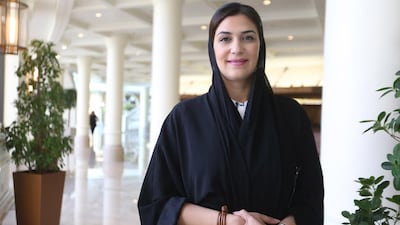ABU DHABI // Hundreds of children and young adults have answered a call to action by the Emirates Foundation to come up with inventive ideas that help to solve a range of social problems.
More than 500 people between the ages of 15 and 35 from across the GCC entered the Emirates Award for Arabian Gulf Youth, launched earlier this year.
“It actually has been quite a surprise,” said Khuloud Al Nuwais, the Emirates Foundation’s chief sustainability officer on the opening day of the two-day Youth Philanthropy Summit. “There are young people now – and we are seeing this more and more – who are interested in giving back to their own communities.”
“They are really many interesting ideas,” said Maytha Al Habsi, chief programme officer for the Emirates Foundation. “One of them is creating a mobile salon for special-needs children, which I thought was really quite interesting.”
Other inspiring entries included a high school girl from Saudi Arabia who designed a waterproof hearing aid, a team from the UAE that created a social lunch box business to help improve children’s eating habits and a team made up of youngsters from Oman, Kuwait and the UAE that devised a centre focused on offering training on cultural awareness, well-being and fitness.
“The three winners will receive funding and mentoring support from our partners in the region to turn these concepts into reality,” said Mrs Al Nuwais. “This is exactly how the Emirates Foundation aspires to impact young people’s lives in a positive and permanent way – by building partnerships and having our partners seeing real returns on their social investment.”
The top 15 candidates will demonstrate their ideas to a panel of judges on November 17, with the top three awarded financial prizes in a ceremony the following day. The first-place winner will take home Dh100,000 in funding for his or her project. The runner-up will win Dh75,000 and third-place Dh50,000.
In addition, each winner will be enrolled in a mentorship programme to help develop their ideas.
“They wanted this kind of empowerment, so we developed this award specifically,” said Ms Al Habsi. “It’s all about really understanding what youth need and creating innovative solutions out of it.”
A report also released by the Emirates Foundation put the UAE at the top of five GCC countries that have made charitable donations or supplied overseas aid packages of US$1 million (Dh3.6m) or more in the last year. Thirty-eight donations totalling about $1.84 billion were made in 2013, the 2014 Coutts Million Dollar Donors Report revealed. Out of this, 26 donations were made by foundations, individuals and government bodies in the UAE.
A $1.25bn, five-year grant from the UAE to Morocco, financed by the Abu Dhabi Fund for Development as part of the emirate’s contribution to the GCC’s Gulf Development Fund Initiative, was the largest aid contribution.
Kuwaiti Emir Sheikh Sabah Al Ahmad Al Jaber Al Sabah made the second-largest, a gift of $300m in support of the Syrian people. The third-largest came from the UAE when the UAE Red Crescent Authority donated $58m to help underprivileged people at home.
The financial support from the UAE comprised 79.8 per cent of donations, this was followed by Kuwait which gave 17.6 per cent, while Saudi Arabia contributed 1.8 per cent, Qatar gave 0.5 per cent and Bahrain donated 0.3 per cent of the total. Oman was the only GCC country not to make any donations of US$1 m or more.
Mrs Al Nuwais said donations from Gulf countries were likely to be even higher than what has been reported.
“In the Arab region usually, as part of the culture, people don’t really publicise their giving so the numbers are not accurate for that reason. We think it’s more than this.”
Most of the donations from GCC countries went overseas to assist in disaster relief, humanitarian assistance and education, according to the report.
newsdesk@thenational.ae

